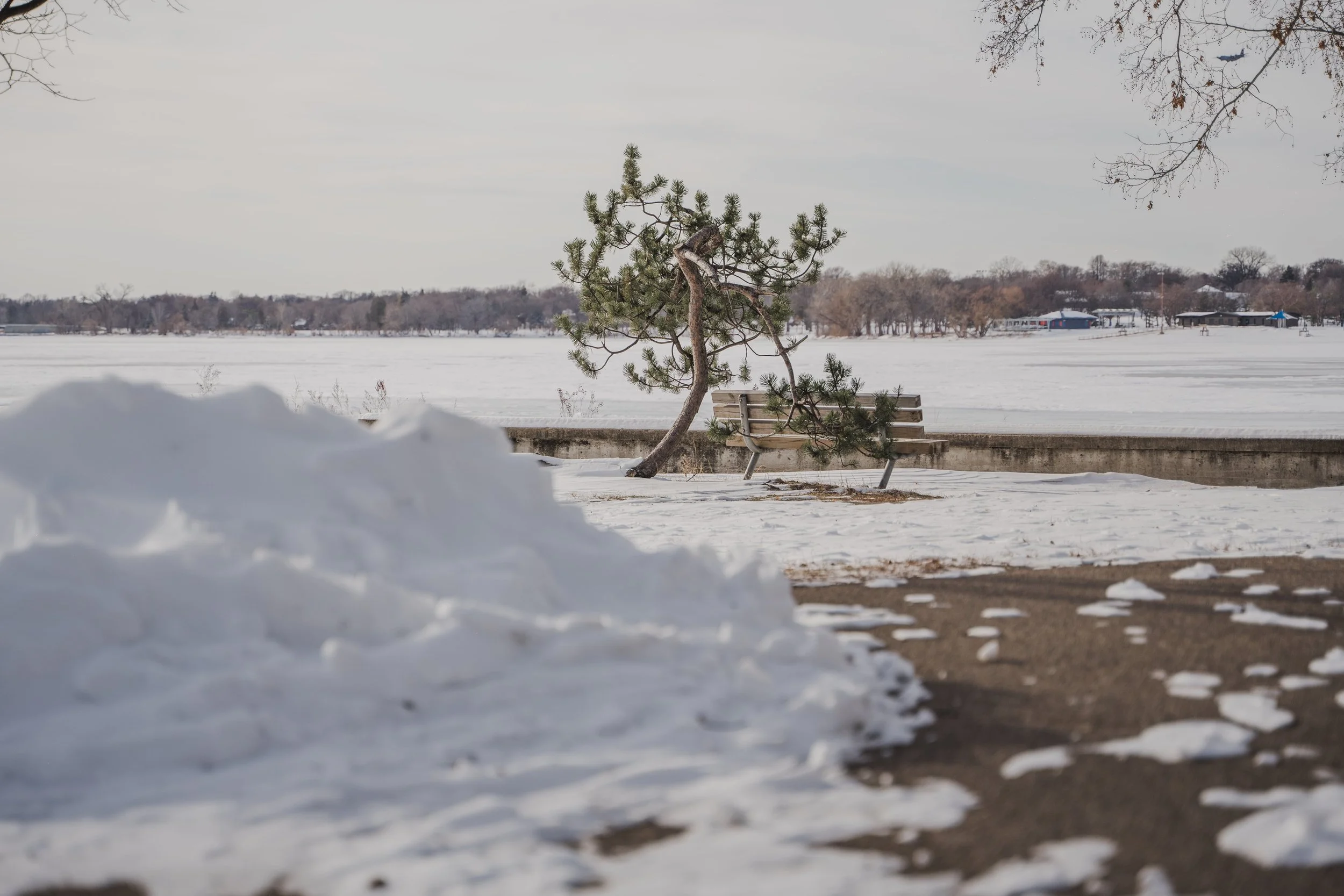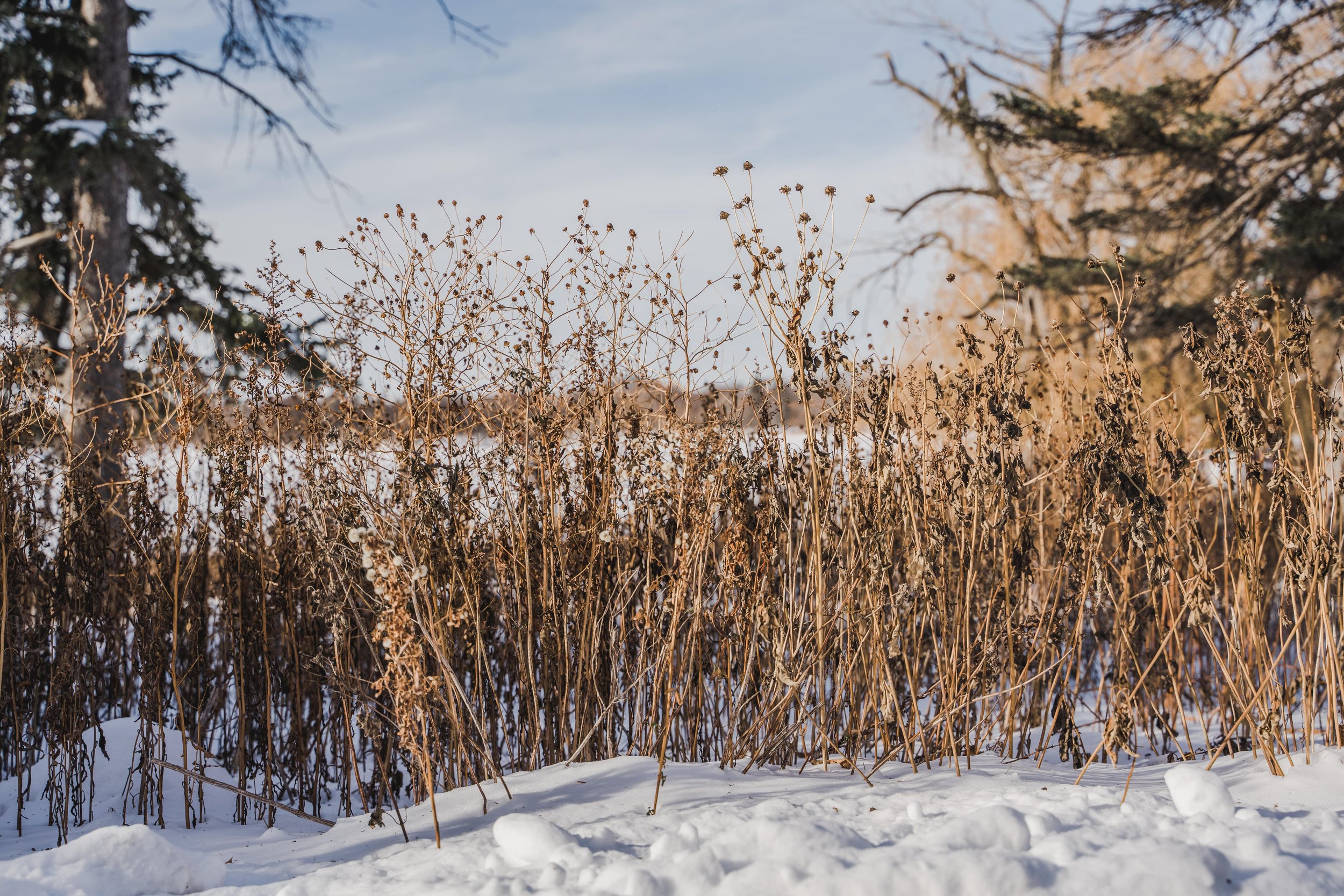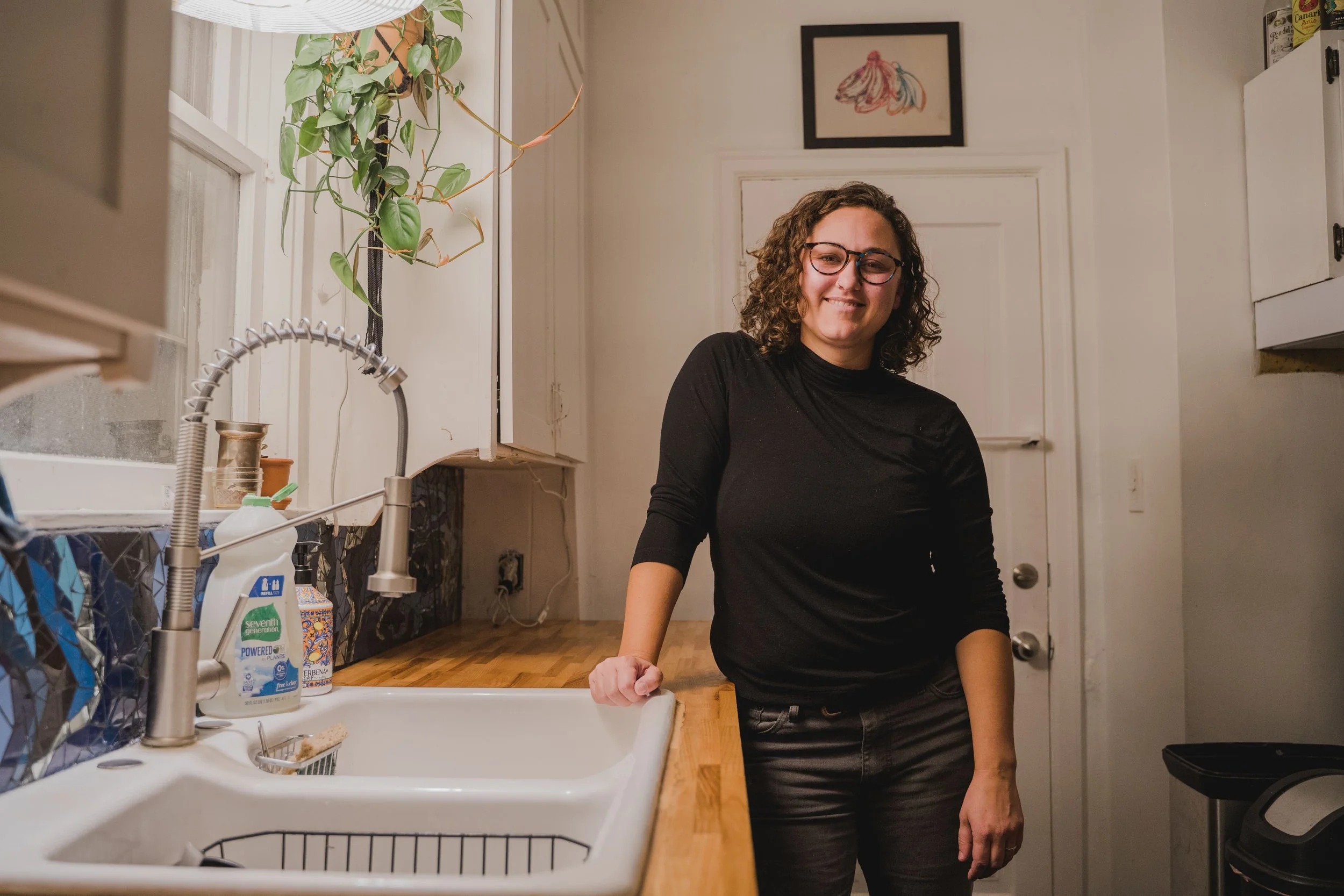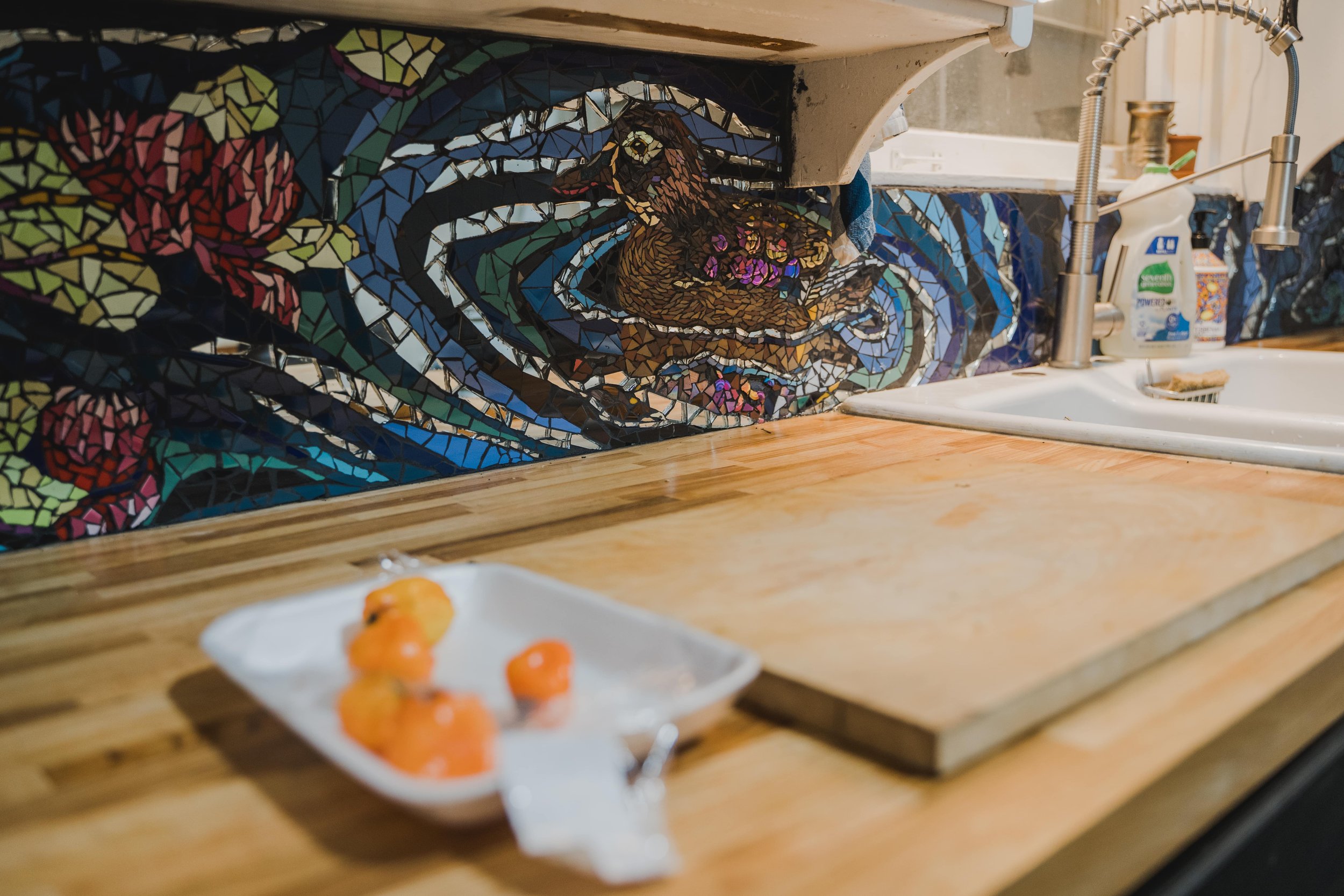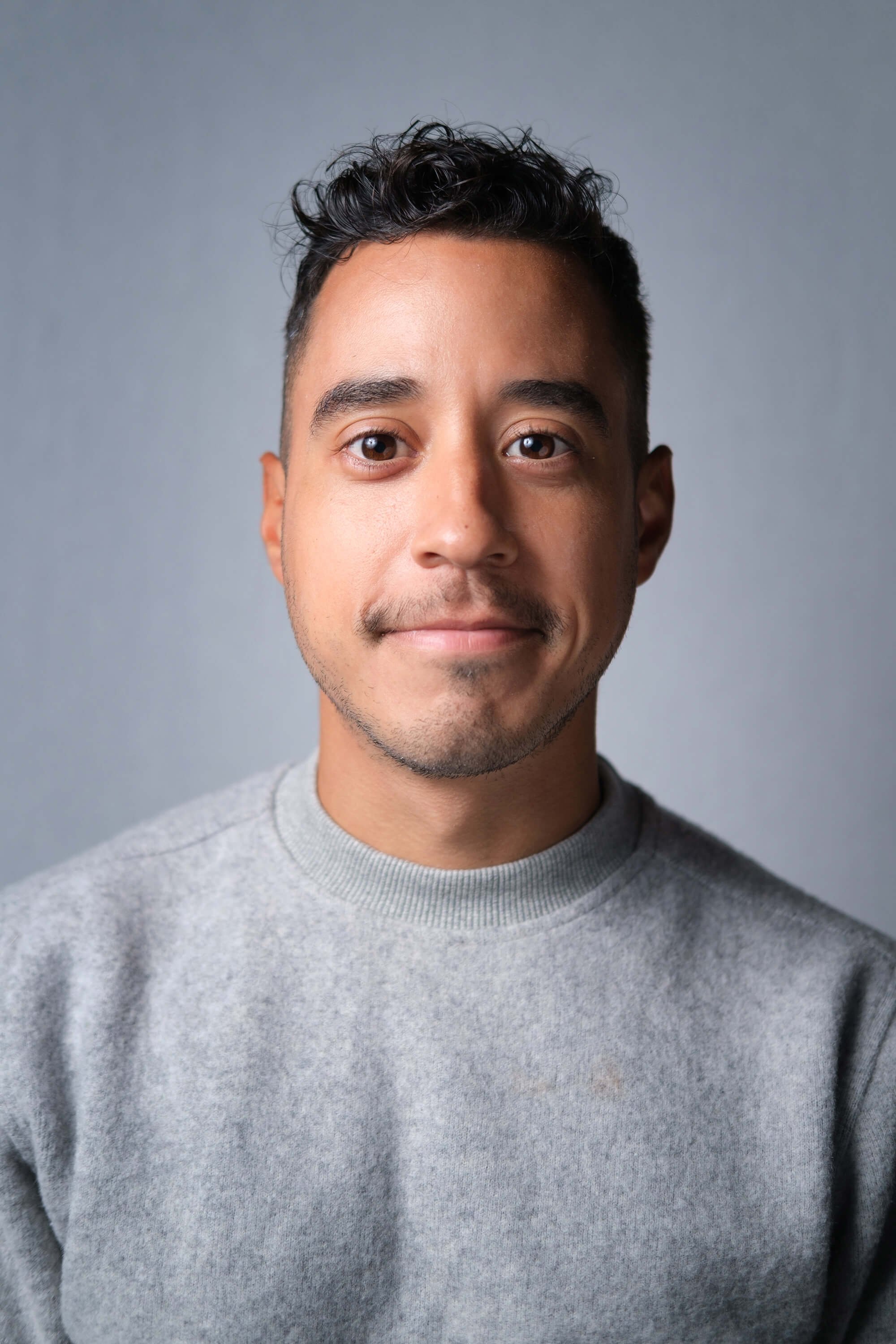A Time for Reflection: An Artist's Guide to Embracing the Winter Months
By Drew Arrieta
As winter descends upon Minnesota, many of us find ourselves reflecting on the changing seasons and the opportunities they bring. For me, winter has always been a time for rest and recovery. But as I've learned in my five seasons living in Minnesota, the reality of that can be inconclusive. So I set out to talk to friends and fellow artists about their own experiences with winter to see how they make the most of it.
Each interview begins with an original collage artwork I created in response to our conversation.
One of the people I spoke with was Alexandra Beaumont, a textile artist and dancer whose work reminds me of playful movement and comfort. I figured if anyone could help me find some semblance of that during the long Minnesota winter, it would be her.
On a chilly December day, I met Alexandra at Lake Nokomis, where she and her husband have been making a ritual of walking around the lake for the past few winters. In fact, it was on the frozen lake in 2020 that Alexandra said "yes" to marriage. As we walked, she shared with me how she finds meaning and purpose in the winter season, and how she stays connected to herself and the new year during the colder months.
Chicken soup for the soul, digital collage, 2023
Alexandra: When my partner and I started dating we would come out here a lot and walk around the lake and talk. Lots of conversations. In the beginning they're always just like really creatively generative and fun. And then, especially during the pandemic, we made it much more of a habit of walking.
I really love it here. It's a great place where I feel some solace and it's also been a place for lots of inspiring conversations.
Drew: My favorite part about winter is the calm. The peacefulness of it and feeling of less busyness. You know?
Alexandra: Yeah it's just different overall. I think there is a hibernating energy but it also feels like something is germinating. I think a lot about getting into the mindset of what am I preparing for, what am I resting from, and what am I planning to put more into? This time is a comforting middle place.
Drew: I really like that explanation. What do you hope germinates for you? Do you have a germinating philosophy? (laughter)
Alex: I think winter has definitely become a reflective time for me. So a chance to kind of look back at what has happened over the year, kind of try and process and figure out what I want to do differently and better for the year to come.
I have a few categories I process. So there's like parenting, my creative work, my relationships and our home life.
Drew: What's been your relationship with winter overall? Did you grow up in a winter climate?
Alexandra: I grew up in South Carolina and then I went to college in New York. That was the first time I really experienced winter. Before then, I think I saw snow maybe like three times during the course of my life. In New York you're stomping through slush. Once you're on the train. It gets so hot. It's a real pain in the butt. Here it's intense. I learned this real quick in Minnesota. You have to look ahead in a way and prepare for what's coming with winters and I never experienced that growing up.
Drew: Has winter influenced your creative life?
Alexandra: I'm not sure that I can really gauge how it's had an impact on my creative life. But I think in a general and most broad way. You don't just power through winter here. Like you have to come to an acceptance. Or you can resist which is like a real uphill battle.
Or you can find ways to embrace it. So I feel like that's actually a good life lesson (laughter). We bought a house last year and I demanded that we have a house with a wooden fireplace. And I basically light fires every day and just sit there.
Drew: There's something so cozy and nourishing about a fireplace. I like to put a fireplace on YouTube and listen to the crackle while playing music. There's something really warm and peaceful about it. I can't think of another time of year that it makes sense to do that. It doesn't feel the same. (laughter)
Alexandra: Right it doesn't work any other time of the year. Yeah, so I try to appreciate what each moment has to offer. It sounds very much like Chicken Soup for the Soul.
Drew: Hey, you know, there's a reason those books were best sellers.
As I entered Olivia Levins Holden's kitchen, I was immediately transported to my grandmother's home. The warm, inviting space was adorned with a hanging tray filled with ripe fruits and vegetables, and a traditional pilon sat on the table, ready to be used for crushing fresh herbs and spices.
Olivia is a muralist, painter, and educator who puts community at the center of her work. Her mural work can be seen in the Twin Cities, California, and Puerto Rico.
Throughout our conversation, Olivia prepared multiple batches of pique, a traditional Puerto Rican hot sauce that is unique to each household. The sauce is made with a blend of vinegar, spicy peppers, garlic, cilantro, and other ingredients to suit one's taste. No two piques are the same, and the same bottle is often replenished with more vinegar and spices as it's used.
As we talked, Olivia shared with me the importance of her Puerto Rican roots and how winter can bring people together. It was clear that for Olivia, creating art and building community are deeply intertwined, and her passion for both shone through in her every word.
Gather all around, digital collage, 2023
Drew: How long ago did you start making pique?
Olivia: A couple years ago. I make it throughout the year but cooking special tasting comfort food is something I do in the winter. Something that tastes like some kind of home. Whether it is here or there (Puerto Rico). It feels like an indulgence in the winter. It’s a thing that is not of this world. It brings you to another place.
Drew: That sounds really magical. Is there anything you do only in the winter and not other times of the year?
Olivia: The thing that my partner, Eiko, was just going to do. Getting into an icy lake. It’s an activity that is some kind of perfect hybrid of being like a diasporican mixed kid in Minnesota. (laughter). Half of the people I come from would be horrified. The other half would be like absolutely “go on child.”
Drew: I feel like more people with diverse backgrounds are taking part of winter culture that wasn’t embraced or considered before.
Olivia: Totally. I did this thing a couple years ago called the Dialects of Decolonizing. It was through the organization CEPA based in Puerto Rico. Locally, we had folks from different BIPOC backgrounds in Minnesota connecting and exploring what it means to embody and practice decolonizing while living in Minnesota.
In one of our conversations, Eiko brought up something that has stuck with me. It goes against the whole culture of complaining about “oh, why do we live here?” When you think about the fact that there is a long lineage of people who believe they originated from here, who have evolved with this place, who have ways to survive here, and find beauty in this landscape. It’s helped me to feel that it is a magical, beautiful, incredible thing that happens here.
Drew: That’s so true and a powerful reminder. Is there an aspect of the winter culture you appreciate in Minnesota?
Olivia: Yeah, what I really love here is how people help each other dig their cars out. It always just gives me so much dopamine.
Drew: That’s something I’ve taken for granted and never appreciated how unique it is. It gives me faith in humanity.
Olivia: I know! I’m like why do I get teary eyed seeing other people helping each other? It’s like one of those things that feel like a very baseline way to help. I feel this way especially when I see people who are clearly new to the state. Like immigrants from different countries where this is not the norm. I just feel for them. I’ve never done this but dream of driving around and just stopping to help people (laughter). I’m really feeling this idea. Not as a way to feel good about myself, but for that rush of setting people free who are stuck in snow.
Drew: The camaraderie. It really gives you a sense of connection with others, more than other times of the year because winter really connects us. We’re all living through the highs and lows of it.
Drew Arrieta is a multidisciplinary artist based in occupied Imnížaska Othúŋwe, now known as St. Paul, MN. His photography and collage works are deeply rooted in storytelling, exploring themes of resistance, current events, and his family's Puerto Rican heritage. Drew regularly contributes to Project Drawdown, a climate solutions non-profit, and Public Functionary, an artist-led exhibition and social space. His work has been featured in Vogue, NBC News, and Columbia Journalism Review.


